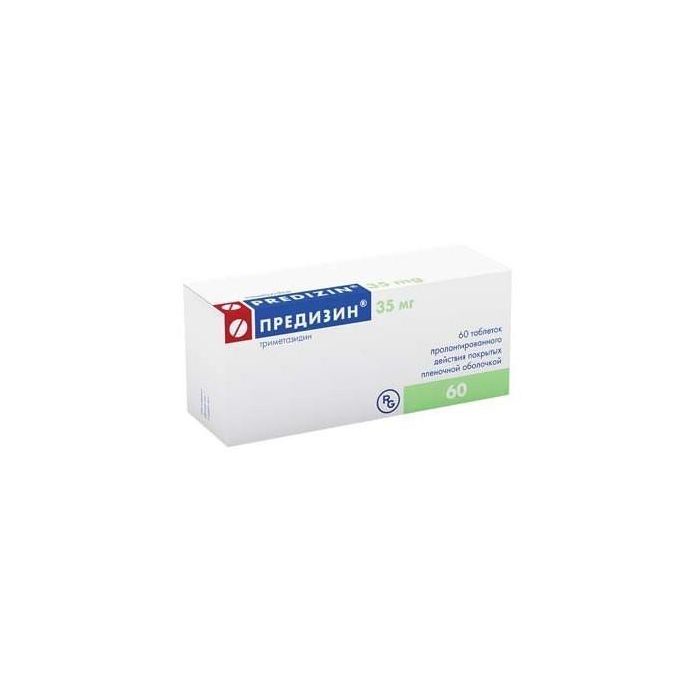Trimetazidine | Predisin tablets 35 mg, 60 pcs.
Special Price
$41
Regular Price
$50
In stock
SKU
BID465442
Release form
Film-coated sustained-release tablets.
Film-coated sustained-release tablets.
Release form
Film-coated sustained-release tablets.
Packing
60 pcs.
Pharmacological action of
Directly affecting cardiomyocytes and brain neurons, it optimizes their metabolism and function. The cytoprotective effect is due to increased energy potential, activation of oxidative decarboxylation and rationalization of oxygen consumption (increased aerobic glycolysis and blockade of fatty acid oxidation).
Supports myocardial contractility, prevents intracellular depletion of ATP and phosphocreatine. Under conditions of acidosis, it normalizes the functioning of the ion channels of the membranes, prevents the accumulation of Ca2 + and Na + in cardiomyocytes, and normalizes the intracellular concentration of K +.
Reduces intracellular acidosis and the concentration of phosphates due to myocardial ischemia and reperfusion.
Prevents the damaging effects of free radicals, preserves the integrity of cell membranes, prevents the activation of neutrophils in the ischemic zone, increases the duration of the electric potential, reduces the output of CPK from cells and the severity of ischemic damage to the myocardium.
With angina pectoris it reduces the frequency of seizures (nitrate consumption decreases), after 2 weeks of treatment, exercise tolerance increases, blood pressure drops decrease. With vascular pathology, the eye restores the functional activity of the retina.
Indications
CHD, angina pectoris, chorioretinal disorders with ischemic component, vestibulo-cochlear disorders of ischemic etiology (dizziness, tinnitus, hearing impairment).
Contraindications
Hypersensitivity, chronic renal failure (CC less than 15 ml / min), pregnancy, lactation, childhood.
Special instructions
Do not use to relieve an attack of angina pectoris.
Composition
1 tablet contains 35 mg trimetazidine dihydrochloride.
Dosage and administration
Inside, 20 mg 2-3 times a day (40-60 mg / day), with meals.
modified release tablets: 35 mg 2 times a day.
Side effects
Frequency: very often - more than 1/10 often - more than 1/100 and less than 1/10 infrequently - more than 1/1000 and less than 1/100 rarely - more than 1/10000 and less than 1/1000 very rarely - less than 1/10000, including individual messages.
From the digestive system: often - abdominal pain, diarrhea, dyspepsia, nausea, vomiting.
From the CCC: rarely - orthostatic hypotension, to the skin of the face.
From the side of the central nervous system: often - dizziness, headache very rarely - extrapyramidal disorders (tremor, stiffness, akinesia), reversible after discontinuation of the drug.
From the skin and subcutaneous tissue: often - rash, itching, urticaria.
Other: often - asthenia.
Storage conditions
In the dark place at a temperature of no higher than 20 РC.
Expiration
3 years.
Dosage form
tablets
Indications
Angina, Ishemicheskaya bolezny Serdtse
Gedeon Richter Vengriya
Film-coated sustained-release tablets.
Packing
60 pcs.
Pharmacological action of
Directly affecting cardiomyocytes and brain neurons, it optimizes their metabolism and function. The cytoprotective effect is due to increased energy potential, activation of oxidative decarboxylation and rationalization of oxygen consumption (increased aerobic glycolysis and blockade of fatty acid oxidation).
Supports myocardial contractility, prevents intracellular depletion of ATP and phosphocreatine. Under conditions of acidosis, it normalizes the functioning of the ion channels of the membranes, prevents the accumulation of Ca2 + and Na + in cardiomyocytes, and normalizes the intracellular concentration of K +.
Reduces intracellular acidosis and the concentration of phosphates due to myocardial ischemia and reperfusion.
Prevents the damaging effects of free radicals, preserves the integrity of cell membranes, prevents the activation of neutrophils in the ischemic zone, increases the duration of the electric potential, reduces the output of CPK from cells and the severity of ischemic damage to the myocardium.
With angina pectoris it reduces the frequency of seizures (nitrate consumption decreases), after 2 weeks of treatment, exercise tolerance increases, blood pressure drops decrease. With vascular pathology, the eye restores the functional activity of the retina.
Indications
CHD, angina pectoris, chorioretinal disorders with ischemic component, vestibulo-cochlear disorders of ischemic etiology (dizziness, tinnitus, hearing impairment).
Contraindications
Hypersensitivity, chronic renal failure (CC less than 15 ml / min), pregnancy, lactation, childhood.
Special instructions
Do not use to relieve an attack of angina pectoris.
Composition
1 tablet contains 35 mg trimetazidine dihydrochloride.
Dosage and administration
Inside, 20 mg 2-3 times a day (40-60 mg / day), with meals.
modified release tablets: 35 mg 2 times a day.
Side effects
Frequency: very often - more than 1/10 often - more than 1/100 and less than 1/10 infrequently - more than 1/1000 and less than 1/100 rarely - more than 1/10000 and less than 1/1000 very rarely - less than 1/10000, including individual messages.
From the digestive system: often - abdominal pain, diarrhea, dyspepsia, nausea, vomiting.
From the CCC: rarely - orthostatic hypotension, to the skin of the face.
From the side of the central nervous system: often - dizziness, headache very rarely - extrapyramidal disorders (tremor, stiffness, akinesia), reversible after discontinuation of the drug.
From the skin and subcutaneous tissue: often - rash, itching, urticaria.
Other: often - asthenia.
Storage conditions
In the dark place at a temperature of no higher than 20 РC.
Expiration
3 years.
Dosage form
tablets
Indications
Angina, Ishemicheskaya bolezny Serdtse
Gedeon Richter Vengriya
Submit your review to Earn 10 Reward Points click here to login
Write Your Own Review

